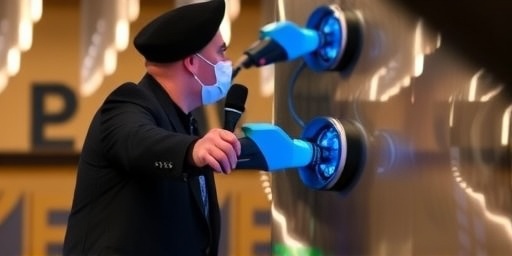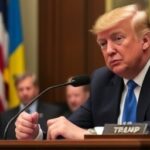In a bold stand against recent policy reversals, Rep. Kevin Mullin, alongside 88 fellow lawmakers from both sides of the aisle, has issued a urgent plea to congressional leaders. They are demanding the preservation of federal investments in electric vehicles during the high-stakes negotiations for reauthorizing the bipartisan surface transportation legislation. This move comes as the Trump administration’s rollbacks threaten to undermine years of progress toward sustainable transportation infrastructure.
- Lawmakers Unite to Counter Trump Administration’s EV Funding Cuts
- Electric Vehicles at the Heart of Surface Transportation Reauthorization
- Rep. Kevin Mullin’s Leadership Bridges Partisan Divides on Clean Energy
- Industry Experts and Stakeholders Weigh In on EV Investment Protections
- Navigating Challenges and Charting the Path Forward for Transportation Legislation
The letter, addressed to key figures in Congress, underscores the critical role of electric vehicles in reducing carbon emissions and bolstering America’s energy independence. With transportation accounting for nearly 29% of U.S. greenhouse gas emissions according to the Environmental Protection Agency (EPA), lawmakers argue that slashing these funds could derail the nation’s climate goals and economic growth in the clean energy sector.
Lawmakers Unite to Counter Trump Administration’s EV Funding Cuts
The bipartisan effort spearheaded by Rep. Kevin Mullin highlights a rare unity in a divided Congress. The group, which includes Democrats and Republicans from diverse districts, is pushing back against the Trump administration’s recent decisions to rescind over $1 billion in previously allocated funds for electric vehicle charging infrastructure and research programs. These rollbacks, initiated through executive actions in late 2020, aimed to redirect resources toward traditional fossil fuel-based transportation projects.
“We cannot allow short-sighted policies to jeopardize our future,” Rep. Mullin stated in the letter. “Electric vehicles represent not just an environmental imperative but an economic opportunity that spans red and blue states alike.” The California representative, known for his work on infrastructure and innovation, emphasized how these investments have already spurred job creation in manufacturing hubs like Detroit and Silicon Valley.
Supporting data from the Department of Energy shows that federal EV investments have led to a 40% increase in domestic battery production capacity since 2018. Yet, the administration’s moves have stalled projects, including the deployment of 500,000 EV chargers nationwide by 2030, a goal outlined in the original bipartisan FAST Act of 2015. Lawmakers in the coalition, representing states from California to Texas, warn that without protection, these setbacks could cost the U.S. its competitive edge against global leaders like China in the EV market.
The letter details specific concerns, such as the potential elimination of grants under the Low or No Emission Vehicle Program, which has funded over 2,000 electric buses in public transit systems. Urban areas like Los Angeles and New York City, heavily reliant on these initiatives, stand to lose the most, exacerbating air quality issues in low-income communities disproportionately affected by pollution.
Electric Vehicles at the Heart of Surface Transportation Reauthorization
As Congress gears up to reauthorize the surface transportation bill—set to expire in 2026—the debate over electric vehicles has taken center stage. The legislation, which allocates roughly $300 billion over five years for highways, bridges, and public transit, includes key provisions for EV infrastructure. Rep. Kevin Mullin and his colleagues are advocating for an expansion, proposing an additional $7.5 billion in dedicated funding to accelerate the transition to zero-emission fleets.
Electric vehicles are no longer a niche market; sales surged 55% in the U.S. in 2023 alone, per the International Energy Agency (IEA), driven by incentives like the federal tax credit under the Inflation Reduction Act. However, the Trump-era rollbacks targeted these very incentives, attempting to phase out rebates that have made EVs affordable for middle-class families. The bipartisan group argues that reinstating and protecting these measures is essential for the transportation sector’s evolution.
In practical terms, this means safeguarding programs like the National Electric Vehicle Infrastructure (NEVI) Formula Program, which distributes funds to states for building charging stations along major highways. California, for instance, has used NEVI grants to install over 1,200 chargers since 2022, reducing range anxiety for long-distance EV drivers. Without congressional intervention, experts fear a patchwork of state-level efforts that could fragment the national EV ecosystem.
Transportation Secretary Pete Buttigieg has echoed these sentiments, noting in a recent briefing that “investing in electric vehicles is investing in American innovation.” The coalition’s letter cites statistics from the Union of Concerned Scientists, projecting that full EV adoption by 2050 could save consumers $1.7 trillion in fuel costs and prevent 3.3 billion tons of carbon emissions.
Rep. Kevin Mullin’s Leadership Bridges Partisan Divides on Clean Energy
Rep. Kevin Mullin, a Democrat from California’s 15th district, has emerged as a pivotal figure in this bipartisan push. With a background in local government and a focus on technology-driven solutions, Mullin has championed legislation that balances environmental protection with economic development. His involvement in the House Select Committee on the Climate Crisis has equipped him with the insights needed to rally support across party lines.
“This isn’t about politics; it’s about progress,” Mullin told reporters after the letter’s release. Joining him are high-profile Republicans like Rep. Brian Fitzpatrick of Pennsylvania, who represents auto-heavy districts benefiting from EV manufacturing shifts, and Democrats such as Rep. Debbie Dingell of Michigan, a longtime advocate for the auto industry.
The coalition’s diversity underscores the broad appeal of electric vehicles. In Republican-led states like Tennessee and Georgia, EV plants from companies like Ford and Rivian are creating thousands of jobs. A report from the BlueGreen Alliance estimates that scaling up EV infrastructure could generate 50,000 jobs annually through 2030. Mullin’s strategy involves framing the issue as a national security priority, reducing reliance on foreign oil and countering China’s dominance in battery supply chains.
Challenges remain, however. Some conservative lawmakers express concerns over the upfront costs of EV transitions, citing infrastructure burdens on rural areas. To address this, the letter proposes targeted subsidies for high-need regions, ensuring equitable distribution of federal dollars. Mullin’s office has been in talks with industry groups like the Electric Drive Transportation Association, which praises the effort as “a game-changer for bipartisan cooperation.”
Industry Experts and Stakeholders Weigh In on EV Investment Protections
Beyond Congress, the call to protect electric vehicle investments has garnered support from a wide array of stakeholders. Automakers, environmental organizations, and labor unions are aligning with Rep. Kevin Mullin’s initiative, viewing it as a safeguard against regulatory uncertainty. Tesla CEO Elon Musk tweeted his approval, stating, “Bipartisan action on EVs is crucial for America’s leadership in sustainable transport.”
The American Lung Association highlighted health benefits, noting that widespread EV adoption could prevent 100,000 premature deaths from air pollution by 2040, based on their modeling. Meanwhile, the U.S. Chamber of Commerce, often skeptical of green mandates, supports the transportation reauthorization for its potential to modernize supply chains and boost GDP by 1.5% through infrastructure spending.
Critics, including some oil industry representatives, argue that the focus on electric vehicles overlooks hybrid technologies and biofuels. However, data from the National Renewable Energy Laboratory counters this, showing EVs offer superior long-term efficiency and lower total ownership costs—up to 60% less over a vehicle’s lifetime compared to gas-powered cars.
In state capitols, governors from both parties are lobbying Congress. California’s Gavin Newsom has pledged matching funds for federal EV grants, while Texas Gov. Greg Abbott has quietly backed charger installations along interstate corridors to support logistics firms transitioning to electric fleets. These endorsements amplify the bipartisan nature of the push, pressuring congressional leaders to prioritize EV protections in negotiations.
Navigating Challenges and Charting the Path Forward for Transportation Legislation
With negotiations intensifying, the bipartisan coalition led by Rep. Kevin Mullin faces hurdles in a polarized Congress. Budget hawks on both sides are scrutinizing the $300 billion price tag of the surface transportation reauthorization, questioning how to balance EV investments with repairs to aging bridges and roads. The Congressional Budget Office projects that without additional funding, the Highway Trust Fund could face insolvency by 2028, adding urgency to the talks.
To overcome these obstacles, lawmakers are exploring public-private partnerships. For example, the proposed bill includes incentives for utilities to expand grid capacity for EV charging, potentially unlocking $20 billion in private investments. Rep. Mullin has advocated for performance-based metrics, ensuring funds go to projects that demonstrably reduce emissions and create jobs.
Looking ahead, success in these negotiations could set a precedent for future climate legislation. If protected, EV investments might accelerate the Biden administration’s goal of 50% EV sales by 2030, fostering innovations in battery recycling and smart grid integration. Failure, however, risks stalling momentum, allowing imported EVs to flood the market and eroding U.S. manufacturing prowess.
As the House and Senate transportation committees convene hearings next month, all eyes are on how Rep. Kevin Mullin and his 88 allies will influence the final bill. Their effort not only defends electric vehicles but redefines bipartisan transportation policy for a greener, more efficient America. Stakeholders anticipate amendments that could be voted on by early 2025, marking a potential turning point in federal support for sustainable mobility.








